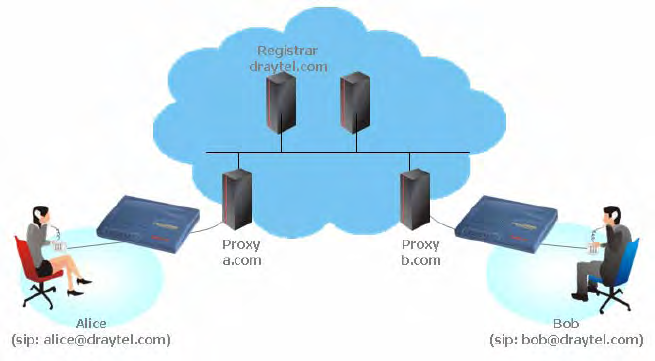
Vigor2910 Series User’s Guide
123
3
3
.
.
1
1
0
0
V
V
o
o
I
I
P
P
Voice over IP network (VoIP) enables you to use your broadband Internet connection to
make toll quality voice calls over the Internet.
There are many different call signaling protocols, methods by which VoIP devices can talk
to each other. The most popular protocols are SIP, MGCP, Megaco and H.323. These
protocols are not all compatible with each other (except via a soft-switch server).
The Vigor V models support the SIP protocol as this is an ideal and convenient deployment
for the ITSP (Internet Telephony Service Provider) and softphone and is widely supported.
SIP is an end-to-end, signaling protocol that establishes user presence and mobility in VoIP
structure. Every one who wants to talk using his/her SIP Uniform Resource Identifier, “SIP
Address”. The standard format of SIP URI is
sip: user:password @ host: port
Some fields may be optional in different use. In general, "host” refers to a domain. The
“userinfo” includes the user field, the password field and the @ sign following them. This is
very similar to a URL so some may call it “SIP URL”. SIP supports peer-to-peer direct
calling and also calling via a SIP proxy server (a role similar to the gatekeeper in H.323
networks), while the MGCP protocol uses client-server architecture, the calling scenario
being very similar to the current PSTN network.
After a call is setup, the voice streams transmit via RTP (Real-Time Transport Protocol).
Different codecs (methods to compress and encode the voice) can be embedded into RTP
packets. Vigor V models provide various codecs, including G.711 A/µ-law, G.723, G.726
and G.729 A & B. Each codec uses a different bandwidth and hence provides different levels
of voice quality. The more bandwidth a codec uses the better the voice quality, however the
codec used must be appropriate for your Internet bandwidth.
Usually there will be two types of calling scenario, as illustrated below:
z Calling via SIP Servers
First, the Vigor V models of yours will have to register to a SIP Registrar by sending
registration messages to validate. Then, both parties’ SIP proxies will forward the
sequence of messages to caller to establish the session.
If you both register to the same SIP Registrar, then it will be illustrated as below:
The major benefit of this mode is that you don’t have to memorize your friend’s IP
address, which might change very frequently if it’s dynamic. Instead of that, you will


















